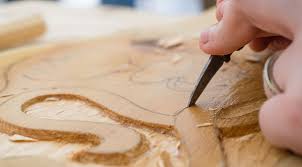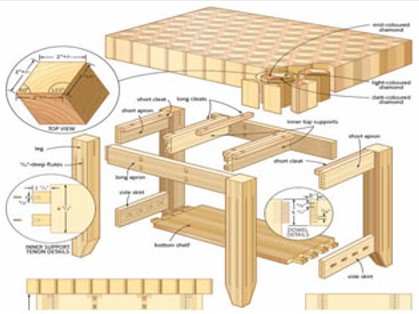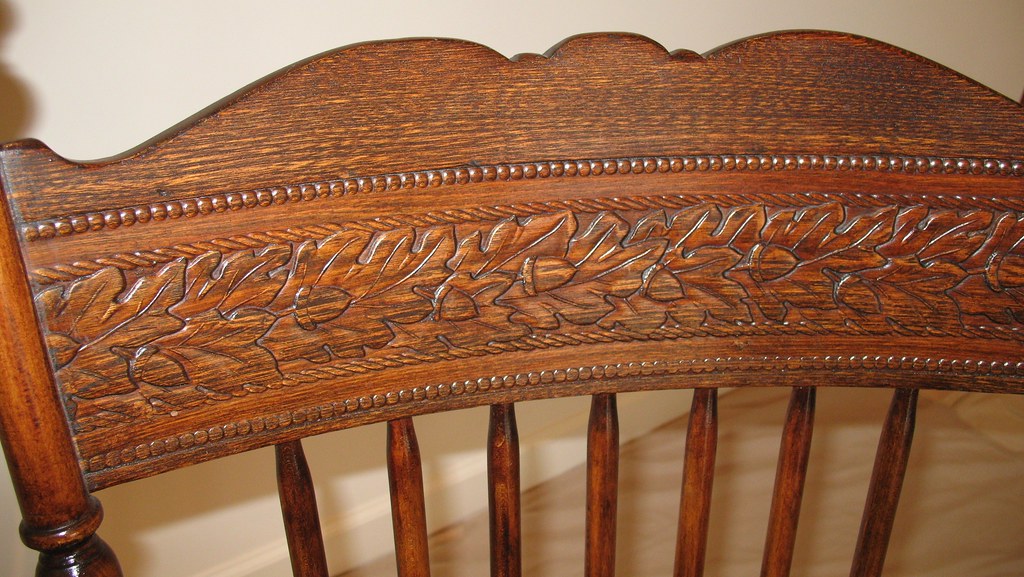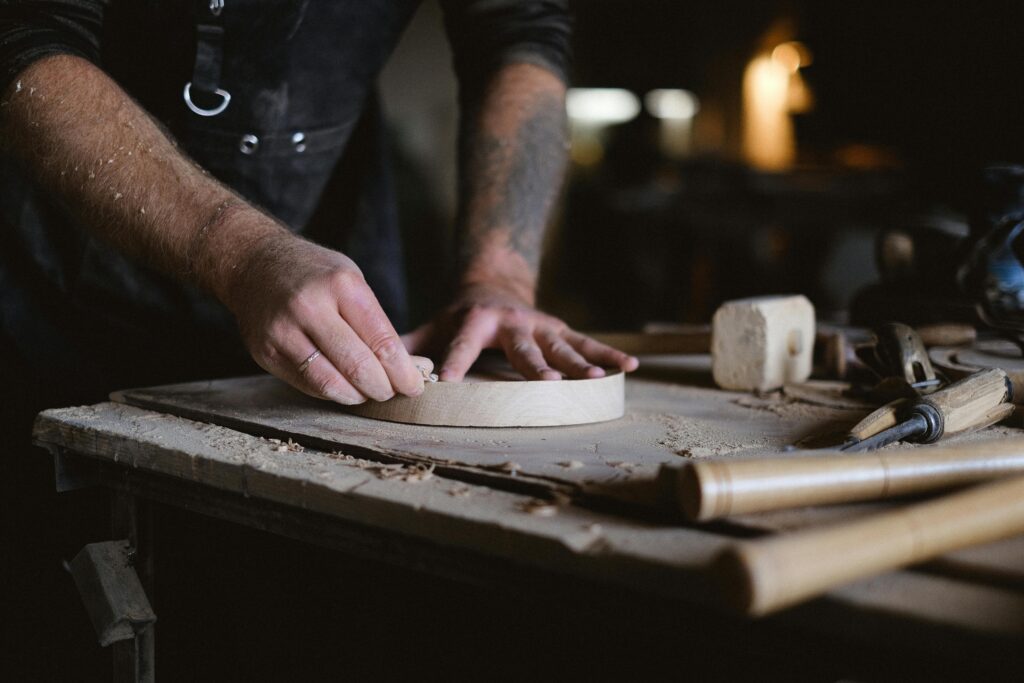Woodworking is a captivating hobby that offers a multitude of benefits, both psychological and social. It is a pursuit that allows individuals to unleash their creativity, engage in a therapeutic process, and experience a profound sense of accomplishment. By delving into the world of woodworking, one embarks on a journey of personal growth, skill development, and emotional well-being.
Get started with DIY woodworking plans

What a hobby in woodworking offers you:
1. Stress Relief and Mindfulness

In our fast-paced and often hectic lives, woodworking serves as a refuge, providing a calming and meditative experience. The act of working with wood demands one’s complete focus and attention, allowing the mind to disengage from the worries and distractions of daily life. As the hands manipulate the tools and materials, a state of mindfulness is achieved, fostering a sense of tranquillity and inner peace.
2. Creativity and Self-Expression

Woodworking is an art form that allows individuals to express their unique creativity and personal style. From intricate carvings to intricate furniture designs, the possibilities are endless. Each project presents an opportunity to explore new techniques, experiment with different materials, and bring one’s vision to life. The satisfaction of crafting a beautiful and functional piece with one’s own hands is unparalleled, instilling a sense of pride and accomplishment.
3. Problem-Solving and Critical Thinking

Woodworking is not merely a physical endeavor; it also engages the mind in a stimulating way. Each project comes with its own set of challenges, requiring problem-solving skills and critical thinking. From designing and planning to executing and troubleshooting, woodworkers must constantly analyze situations, consider alternative solutions, and make informed decisions. This mental exercise helps to sharpen cognitive abilities and develop valuable life skills.
4. Sense of Accomplishment and Self-Efficacy
As a woodworker completes each project, a profound sense of accomplishment and self-efficacy is cultivated. The tangible result of one’s efforts serves as a constant reminder of personal growth, skill development, and the ability to overcome obstacles. This feeling of achievement can boost self-confidence and foster a positive mindset, encouraging individuals to take on new challenges and push their boundaries further.
5. Social Connections and Community
Woodworking is not just an individual pursuit; it also offers opportunities for social connections and community building. Joining woodworking clubs, attending workshops, or participating in online forums allows individuals to share their passion with like-minded enthusiasts. These social interactions foster a sense of belonging, provide opportunities for knowledge sharing, and can lead to lasting friendships and collaborations.
6. Heirloom Creation and Legacy

One of the most rewarding aspects of woodworking is the ability to create heirloom pieces that can be passed down through generations. A finely crafted piece of furniture, a beautifully carved sculpture, or a handmade wooden toy not only holds sentimental value but also serves as a tangible legacy. These pieces become cherished family heirlooms, imbued with the woodworker’s skill, dedication, and personal touch.
7. Environmentally Conscious and Sustainable

Woodworking can also be an environmentally conscious pursuit. By using reclaimed or sustainably sourced materials, woodworkers can contribute to reducing waste and promoting Eco-friendly practices. Additionally, the creation of long-lasting and durable wooden products helps to minimize the demand for disposable and environmentally harmful alternatives.
8. Lifelong Learning and Skill Development
Woodworking is a craft that offers endless opportunities for learning and skill development. As one progresses through various projects, new techniques, tools, and materials are continuously encountered, fostering a thirst for knowledge and a desire to improve. This lifelong learning process helps to keep the mind active and engaged, preventing cognitive stagnation and promoting personal growth.
9. Physical Activity and Coordination

While woodworking is often associated with mental benefits, it also provides physical advantages. The process of working with tools, materials, and projects requires coordination, dexterity, and physical effort. This physical aspect can contribute to overall well-being, improved muscle tone, and enhanced motor skills. Additionally, the repetitive motions involved in woodworking can be therapeutic and help to alleviate stress and tension.
10. Customization and Personalization
One of the unique advantages of woodworking is the ability to create customized and personalized pieces. Whether it’s a piece of furniture tailored to specific dimensions, a unique decoration, or a personalized gift, woodworkers have the freedom to design and craft items that perfectly suit their needs or preferences. This level of customization adds a personal touch and emotional connection to the finished product.
As we delve deeper into the world of woodworking, it becomes evident that this hobby offers a multitude of benefits that extend far beyond the physical realm. From fostering mindfulness and creativity to promoting social connections and environmental consciousness, woodworking has the power to enrich our lives in profound ways. Whether you are a seasoned woodworker or a novice eager to embark on this journey, the rewards of this captivating pursuit are boundless.
Get motivated with Woodworking plans
Q&A
1. What are some of the psychological benefits of woodworking?
Woodworking offers numerous psychological benefits, including stress relief, mindfulness, creativity, problem-solving, a sense of accomplishment, and improved self-efficacy. The repetitive motions and focused attention required can be therapeutic and help alleviate tension.
2. How does woodworking promote social connections?
Woodworking provides opportunities for social connections through clubs, workshops, online forums, and community events. Sharing a passion with like-minded individuals fosters a sense of belonging and can lead to lasting friendships and collaborations.
3. Can woodworking be environmentally friendly?
Yes, woodworking can be an environmentally conscious pursuit. By using reclaimed or sustainably sourced materials, woodworkers can contribute to reducing waste and promoting eco- friendly practices. Additionally, creating long-lasting and durable wooden products minimizes the demand for disposable alternatives.
4. How does woodworking contribute to lifelong learning?
Woodworking is a craft that offers endless opportunities for learning and skill development. As one progresses through various projects, new techniques, tools, and materials are continuously encountered, fostering a thirst for knowledge and a desire to improve.
5. What are the physical benefits of woodworking?
Woodworking requires coordination, dexterity, and physical effort, which can contribute to overall well-being, improved muscle tone, and enhanced motor skills. The repetitive motions involved can also be therapeutic and help alleviate stress and tension.
6. How can woodworking promote creativity and self-expression?
Woodworking allows individuals to express their unique creativity and personal style through intricate carvings, furniture designs, and various projects. Each piece offers an opportunity to explore new techniques and bring one’s vision to life.
7. Can woodworking be a source of income?
While woodworking is often pursued as a hobby, it can also be a source of income for skilled artisans and entrepreneurs. By creating and selling high-quality, handcrafted pieces, woodworkers can turn their passion into a profitable venture.
8. What are some of the challenges in woodworking?
Woodworking can present various challenges, such as mastering advanced techniques, working with complex designs, troubleshooting issues, and ensuring precise measurements and cuts. However, overcoming these challenges can be a rewarding and fulfilling experience.
9. How can woodworking be therapeutic for individuals with disabilities or special needs?
Woodworking can be a therapeutic activity for individuals with disabilities or special needs. The repetitive motions, focus required, and sense of accomplishment can provide a sense of purpose and promote cognitive, physical, and emotional well-being.
10. Can woodworking be a family activity?
Absolutely! Woodworking can be an excellent family activity, allowing parents and children to bond, work together on projects, and create lasting memories. It can teach valuable skills, foster creativity, and provide a shared interest for all family members t

Leave a Reply